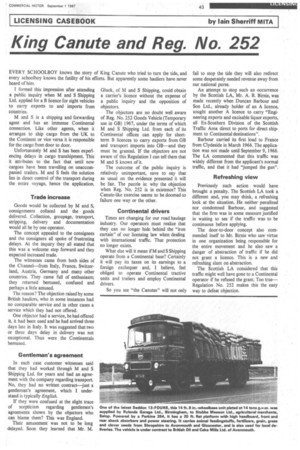I LICENSING CASEBOOK by lain Sherriff MITA
Page 45

If you've noticed an error in this article please click here to report it so we can fix it.
King Canute and Reg. No. 252
EVERY SCHOOLBOY knows the story of King Canute who tried to turn the tide, and every schoolboy knows the futility of his efforts. But apparently some hauliers have never heard of him.
I formed this impression after attending a public inquiry when M and S Shipping Ltd. applied for a B licence for eight vehicles to carry exports to and imports from cottntries.
M and S is a shipping and forwarding agent and has an immense Continental connection. Like other agents, when it arranges to ship cargo from the UK to the Continent or vice versa it is responsible for the cargo from door to door.
Unfortunately M and S has been expeiiiencing delays in cargo transhipment. This it attributes to the fact that until now cargoes have been travelling on unaccompanied trailers. M and S feels the solution lies in direct control of the transport during the entire voyage, hence the application.
Trade increase
Goods would be collected by M and S. consignments collated and the goods delivered. Collection, groupage, transport, stripping, delivery and documentation would all be by one operator.
The concept appealed to the consignees and the consigners all spoke of frustrating delays. At the inquiry they all stated that this was a welcome step forward and they expected increased trade.
The witnesses came from both sides of the Channel—from Italy, France, Switzerland, Austria, Germany and many other countries. They came full of enthusiasm; they returned bemused, confused and perhaps a little amused.
The reason? The objection raised by some British hauliers, who in some instances had no comparable service and in other cases a service which they had not offered.
One objector had a service, he had offered it, it had been used and he had arrived three days late in Italy. It was suggested that two or three days delay in delivery was not exceptional. Thus were the Continentals bemused.
Gentleman's agreement In each case customer witnesses said that they had worked through M and S Shipping Ltd. for years and had an agreement with the company regarding transport. No, they had no written contract—just a gentleman's agreement, which I understand is typically English.
If they were confused at the slight trace of scepticism regarding gentlemen's agreements shown by the objectors who can blame them? This was England.
Their amusement was not to be long delayed. Soon they learned that Mr. M. Gluck, of M and S Shipping, could obtain a carrier's licence without the expense of a public inquiry and the opposition of objectors.
The objectors are no doubt well aware of Reg. No. 252 Goods Vehicle (Temporary use in GB) 1967, under the terms of which M and S Shipping Ltd. from each of its Continental offices can apply for shortterm B licences to carry exports from GB and transport imports into GB—and they must be granted. If the objectors are not aware of this Regulation I can tell them that M and S knows of it.
The outcome of the public inquiry is relatively unimportant, save to say that as usual on the evidence presented it will be fair. The puzzle is: why the objection when Reg. No. 252 is in existence? This Canute-like exercise seems to be doomed to failure one way or the other.
Continental drivers
Times are changing for our road haulage industry. Our operators must realize that they can no longer hide behind the "iron curtain" of our licensing law when dealing with international traffic. That protection no longer exists.
What else will it mean if M and S Shipping operate from a Continental base? Certainly it will pay its taxes on its earnings to a foreign exchequer and, I believe, feel obliged to operate Continental tractive units and trailers and employ Continental drivers.
So you see "the Canutes" will not only fail to stop the tide they will also redirect some desperately needed revenue away from our national purse.
An attempt to stop such an occurrence by the Scottish LA, Mr. A. B. Birnie, was made recently when Duncan Barbour and Son Ltd., already holder of an A licence, sought another A licence to carry "Engineering exports and excisable liquor exports, all Ex-Southern Division of the Scottish Traffic Area direct to ports for direct shipment to Continental destinations".
Barbour carried its first load to France from Clydeside in March 1966. The application was not made until September 9, 1966. The LA commented that this traffic was widely different from the applicant's normal traffic, and that it had "jumped the gun".
Refreshing view
Previously such action would have brought a penalty. The Scottish LA took a different and, you may think, a refreshing look at the situation. He neither penalized nor condemned Barbour, and suggested that the firm was in some measure justified in waiting to see if the traffic was to be continuous before applying.
The door-to-door concept also commended itself to Mr. Birnie who saw virtue in one organization being responsible for the entire movement and he also saw a danger of abstraction of traffic if he did not grant a licence. This is a new and refreshing slant on abstraction.
The Scottish LA considered that this traffic might well have gone to a Continental operator if he refused the grant. Too true— Regulation No. 252 makes this the easy way to defeat objection.












































































































































